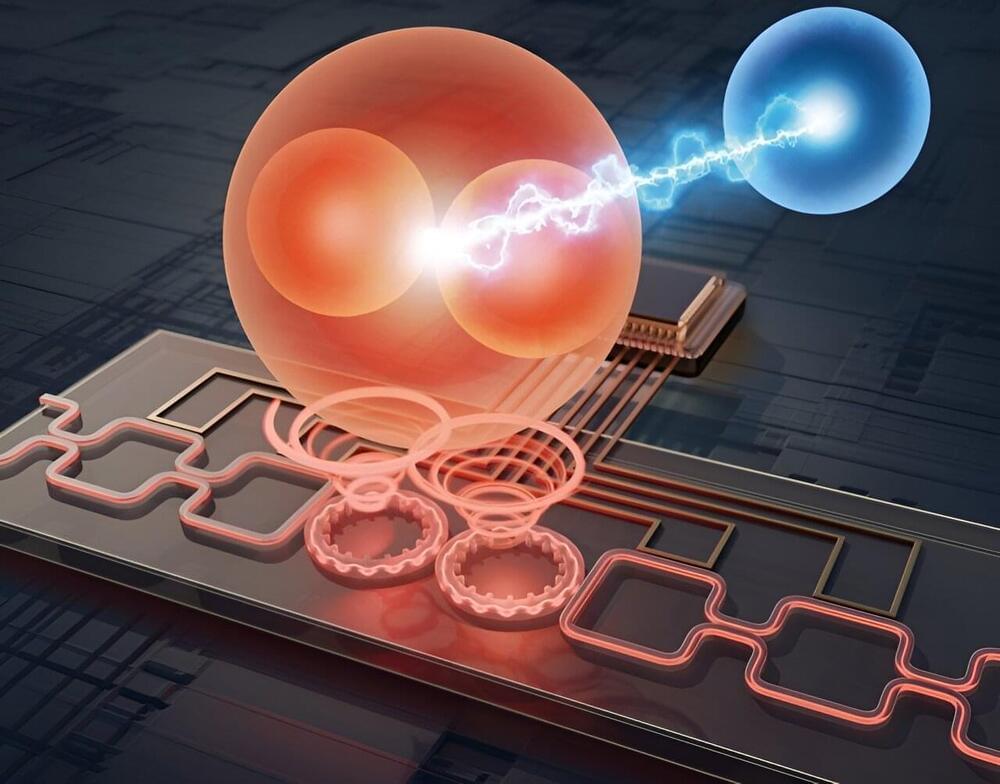Microsoft’s CEO of AI said that content on the open web can be copied and used to create new content.
Category: internet – Page 53

New possibilities for reservoir computing with topological magnetic and ferroelectric systems
Speech recognition, weather forecasts, smart home applications: Artificial intelligence and the Internet of Things are enhancing our everyday lives. Systems based on reservoir computing are a very promising new field.
The research group led by Prof Dr. Karin Everschor-Sitte at the University of Duisburg-Essen (UDE), is conducting research in this area. They are primarily investigating new possibilities for reservoir computing, for example using magnetic materials.
Now, together with specialists from the field of ferroelectric materials, the team has shown that these systems are also suitable for processing complex data faster and more efficiently. Their results have been published in Nature Reviews Physics.

Scientists crack new method for high-capacity, secure quantum communication
Scientists have made a significant breakthrough in creating a new method for transmitting quantum information using particles of light called qudits. These qudits promise a future quantum internet that is both secure and powerful. The study is published in the journal eLight.
Traditionally, quantum information is encoded on qubits, which can exist in a state of 0, 1, or both at the same time (superposition). This quality makes them ideal for complex calculations but limits the amount of data they can carry in communication. Conversely, qudits can encode information in higher dimensions, transmitting more data in a single go.
The new technique harnesses two properties of light—spatial mode and polarization—to create four-dimensional qudits. These qudits are built on a special chip that allows for precise manipulation. This manipulation translates to faster data transfer rates and increased resistance to errors compared to conventional methods.


Japan Unveils 310-Mile Automated Conveyor Belt to Carry Freight of 25,000 Trucks Daily Between Tokyo and Osaka
“Automated logistics roads are designed to get the most out of road space by utilizing hard shoulders, median strips, and tunnels beneath the roadway,” Muramatsu explained.
ALSO READ: A New 6G device is Created by Japan That is 20 times Faster Than 5G Technology
The project involves installing automated conveyor belts in tunnels beneath major highways, on above-ground tracks in the middle of roads, and along hard shoulders. This innovative approach aims to optimize existing road space and enhance freight movement efficiency.

SpaceX Starlink Satellites Deployed In Stunning View From Space
Starlink satellites were deployed by SpaceX. Watch multiple views captured by cameras aboard the Falcon 9 rocket second stage. Credit: Space.com | footage courtesy: SpaceX | edited by Steve Spaleta Music: New Age Solitude by Philip Ayers / courtesy of Epidemic Sound.
How Will We Land Starship… On The Moon?!
Start speaking a new language in 3 weeks with Babbel 🎉. Get up to 60% OFF your subscription ➡Here: https://bit.ly/3VPFjJg.
Here is a link to Astroport’s website: https://explorationarchitecture.com/a…
Landing on the moon is difficult due to its uneven surface and the presence of #regolith, a layer of loose, fragmented material. Regolith is problematic because it can damage equipment and pose safety risks during landings. Using regolith to create bricks for building landing pads is a smart use of in situ resource utilization, reducing the need to transport materials from Earth. Astroport Space Technologies in San Antonio, Texas, is developing technology to manufacture these regolith bricks, aiming to create safe, durable landing sites on the moon.
____________________
Thank you for supporting my channel.
My channel started as a way to keep people up to date on the world of SpaceX’s Starlink, the satellite internet service. The channel has grown to include the broader Elon Musk universe, and mainly focus on the development of Starship.
#SpaceX #starship #elonmusk #starbase.
Your support for my channel means a lot. Thanks for watching and if you have any video ideas, shoot me an email, [email protected].
Find me on instagram, @elianainspace.
Order your own 3D printed Starship at:
https://stardesk.peachs.co/a/eliana-s…
Want to support Ellie in Space?
Join my Patreon here: https://www.patreon.com/user?u=47580275
Logo creator: https://www.tonybela.com/

World record 402 Tb/s transmission in a standard commercially available optical fiber
An international joint research team led by the Photonic Network Laboratory of Japan’s National Institute of Information and Communications Technology (NICT) has demonstrated a record-breaking aggregate optical transmission bandwidth of 37.6 THz to enable a new data-rate record of 402 terabits per second in a standard commercially available optical fiber.
This record was achieved by constructing the first optical transmission system covering all the transmission bands (OESCLU) of the low-loss window of standard optical fibers. The system combined various amplification technologies, some developed for this demonstration, including six kinds of doped fiber optical amplifiers and both discrete and distributed Raman amplification.
Novel optical gain equalizers also allowed access to new wavelength bands that are not yet utilized in deployed systems. The newly developed technology is expected to make a significant contribution to expanding the communication capacity of the optical communication infrastructure as future data services rapidly increase demand.

Starlink Mini: Elon Musk’s backpack-sized 100mbps internet kit launched
SpaceX has introduced a compact version of satellite internet antennas. Called Starlink Mini, the antenna is portable and can be packed in a backpack. The product is dubbed revolutionary due to being a mobile option for satellite internet customers.
Currently, a limited number of antennas are being offered for just $599 each in an early access release. Starlink Mini integrates the WiFi router right inside the dish and can deliver over 100mbps speed.
Elon Musk claims the product has the power to change the world.

SpaceX successful with booster replacement on Starlink mission
SpaceX was back at the launch pad Sunday with an updated rocket to finish off a Starlink mission it tried to send up earlier this month.
A Falcon 9 on the Starlink 10–2 mission lifted off at 1:15 p.m. from Cape Canaveral Space Force Station’s Space Launch Complex 40 amid cloudy skies with 22 more Starlink satellites for the company’s growing internet constellation that now numbers more than 6,100 satellites in orbit.
The launch came nine days since SpaceX last attempted to knock out the mission on June 14. That attempt had a rare scrub as the countdown clock reached 0 and the rocket was ultimately brought back from the pad to allow for last week’s ASTRA 1P satellite launch to go up instead.